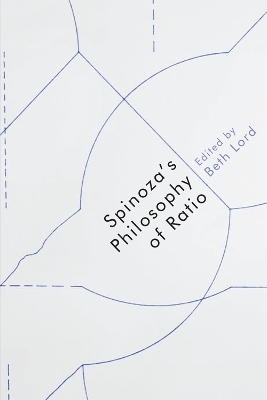
Spinoza'S Philosophy of Ratio
Seiten
2018
Edinburgh University Press (Verlag)
978-1-4744-2043-3 (ISBN)
Edinburgh University Press (Verlag)
978-1-4744-2043-3 (ISBN)
These essays explore the surprisingly varied dimensions of this unacknowledged keystone of Spinoza's thought. They take you from Spinoza's geometrical diagrams to his concepts of mind, body, the emotions and the cosmos.
Discover Spinoza's philosophy of ratio, from geometry and reason to bodies, affects and architectureFrom his geometrical method to his geometrical examples; from his doctrine of reason to his explanation of bodies in motion; and from his account of the affects to his understanding of social relations, ratio is of prime importance in Spinoza's philosophy. These essays explore the surprisingly varied dimensions of this unacknowledged keystone of Spinoza's thought. They take you from Spinoza's geometrical diagrams to his concepts of mind, body, the emotions, and the cosmos. It shows how Spinoza's thinking about ratio influences the concept of proportion in 'Gulliver's Travels', the differential ontology of Deleuze, egalitarian design for wellbeing, and the notion of an affective architecture.Key FeaturesThe first major work to explore ratio as a key concept of Spinoza's thoughtReveals that ratio is a multi-faceted concept that connects geometry, minds, reason, bodies, social relations and the cosmos in Spinoza's philosophyShows how ratio can be used to address enduring questions in Spinoza's thought and take his philosophy in exciting new directionsOffers new applications of Spinoza's thinking to architecture, design and urban studies ContributorsThe first major work to explore ratio as a key concept of Spinoza's thoughtReveals that ratio is a multi-faceted concept that connects geometry, minds, reason, bodies, social relations and the cosmos in Spinoza's philosophyShows how ratio can be used to address enduring questions in Spinoza's thought and take his philosophy in exciting new directionsOffers new applications of Spinoza's thinking to architecture, design and urban studies ContributorsSimon B. Duffy, Yale-NUS College, Singapore. Helene Frichot, KTH, Stockholm, Sweden.Gokhan Kodalak, Cornell University, USA. Michael LeBuffe, University of Otago, Canada. Beth Lord, University of Aberdeen, UK. Heidi M. Ravven, Hamilton College, New York, USA. Peg Rawes, Bartlett School of Architecture, UCL, UK. Anthony Uhlmann, Western Sydney University, Australia. Valtteri Viljanen, University of Turku, Finland. Stefan White, Manchester School of Architecture, UK.Timothy Yenter, University of Mississippi, USA.
Discover Spinoza's philosophy of ratio, from geometry and reason to bodies, affects and architectureFrom his geometrical method to his geometrical examples; from his doctrine of reason to his explanation of bodies in motion; and from his account of the affects to his understanding of social relations, ratio is of prime importance in Spinoza's philosophy. These essays explore the surprisingly varied dimensions of this unacknowledged keystone of Spinoza's thought. They take you from Spinoza's geometrical diagrams to his concepts of mind, body, the emotions, and the cosmos. It shows how Spinoza's thinking about ratio influences the concept of proportion in 'Gulliver's Travels', the differential ontology of Deleuze, egalitarian design for wellbeing, and the notion of an affective architecture.Key FeaturesThe first major work to explore ratio as a key concept of Spinoza's thoughtReveals that ratio is a multi-faceted concept that connects geometry, minds, reason, bodies, social relations and the cosmos in Spinoza's philosophyShows how ratio can be used to address enduring questions in Spinoza's thought and take his philosophy in exciting new directionsOffers new applications of Spinoza's thinking to architecture, design and urban studies ContributorsThe first major work to explore ratio as a key concept of Spinoza's thoughtReveals that ratio is a multi-faceted concept that connects geometry, minds, reason, bodies, social relations and the cosmos in Spinoza's philosophyShows how ratio can be used to address enduring questions in Spinoza's thought and take his philosophy in exciting new directionsOffers new applications of Spinoza's thinking to architecture, design and urban studies ContributorsSimon B. Duffy, Yale-NUS College, Singapore. Helene Frichot, KTH, Stockholm, Sweden.Gokhan Kodalak, Cornell University, USA. Michael LeBuffe, University of Otago, Canada. Beth Lord, University of Aberdeen, UK. Heidi M. Ravven, Hamilton College, New York, USA. Peg Rawes, Bartlett School of Architecture, UCL, UK. Anthony Uhlmann, Western Sydney University, Australia. Valtteri Viljanen, University of Turku, Finland. Stefan White, Manchester School of Architecture, UK.Timothy Yenter, University of Mississippi, USA.
Beth Lord is Senior Lecturer in Philosophy at the University of Aberdeen. She is the author of Kant and Spinozism: Transcendental Idealism and Immanence from Jacobi to Deleuze (2011) and Spinoza's Ethics: an Edinburgh Philosophical Guide (2010), and editor of Spinoza Beyond Philosophy (2012) and the Bloomsbury Companion to Continental Philosophy (2009).
| Erscheinungsdatum | 06.08.2018 |
|---|---|
| Verlagsort | Edinburgh |
| Sprache | englisch |
| Maße | 156 x 234 mm |
| Themenwelt | Geisteswissenschaften ► Philosophie ► Geschichte der Philosophie |
| Geisteswissenschaften ► Philosophie ► Metaphysik / Ontologie | |
| Geisteswissenschaften ► Philosophie ► Philosophie der Neuzeit | |
| ISBN-10 | 1-4744-2043-5 / 1474420435 |
| ISBN-13 | 978-1-4744-2043-3 / 9781474420433 |
| Zustand | Neuware |
| Informationen gemäß Produktsicherheitsverordnung (GPSR) | |
| Haben Sie eine Frage zum Produkt? |
Mehr entdecken
aus dem Bereich
aus dem Bereich
eine Geschichte der Zuversicht von Homer bis zum Klimawandel
Buch | Hardcover (2024)
C.H.Beck (Verlag)
CHF 39,20
die kolonialen Wurzeln der französischen Theorie
Buch | Hardcover (2024)
Matthes & Seitz Berlin (Verlag)
CHF 41,90


